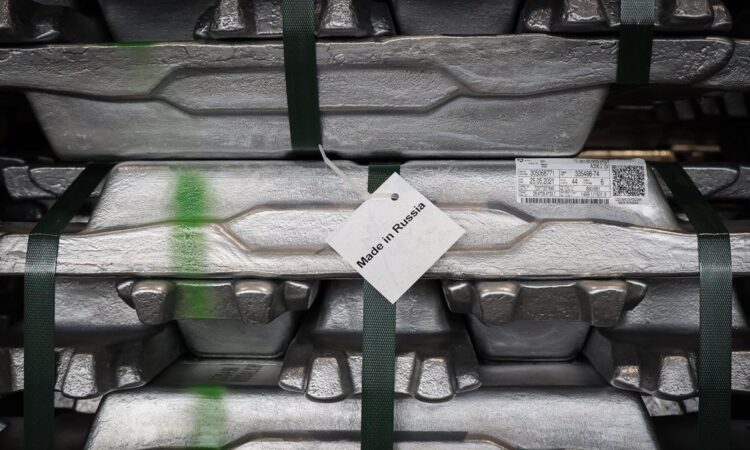
(Bloomberg) — The latest UK sanctions on Russia are creating new faultlines across the global metals world, in the latest example of how the fallout from the war in Ukraine continues to ripple through commodity markets while creating opportunities for those willing to navigate the restrictions.
Most Read from Bloomberg
On the London Metal Exchange, JPMorgan Chase & Co. has stepped in to buy Russian aluminum even as Citigroup Inc. is abandoning the trade, according to people familiar with the matter, who asked not to be identified discussing private information. Chinese-owned metals trader IXM has requested some Russian aluminum since the new rules were announced, while larger rival Trafigura Group has become more cautious.
The divergence between some of the biggest players in metals markets highlights how an ever-expanding array of sanctions is entangling more and more of Russia’s commodity trade.
It’s also causing a headache for the LME, where Russian aluminum now accounts for more than 90% of the live metal inventories. The latest news has revived a debate over whether it should ban Russian supplies to avoid unwanted metal piling up, which threatens to undermine the value of the world’s benchmark aluminum price if fewer traders are willing — or allowed — to handle Russian stocks.
The country’s metals and mining industry had escaped blanket sanctions until last month, when the UK introduced measures prohibiting British companies and individuals from trading a wide range of Russian metals. While an exemption allowed them to continue trading on the LME, the sanctions mean that “UK persons” can’t request delivery of Russian metal from the exchange if it was bought after Dec. 15. The UK government also hinted at future action “in concert with international partners.”
The announcement was met with confusion over which companies and individuals would be affected by the rules — while most large metal traders and banks are headquartered outside of the UK, many have senior British staff and almost all of them have some presence in London.
The biggest participants in metals markets are now responding in different ways.
JPMorgan, for example, has bought some Russian aluminum on the LME in South Korea and requested delivery of the metal, according to people familiar with the matter.
The new restrictions mean that such a trade would be illegal for a UK person. But while some of JPMorgan’s key metal trading staff are British and based in London, the bank believes that the deals are not covered by the UK sanctions because it has been trading through a non-UK entity, the people said.
IXM, the third-largest metals trading house that’s headquartered in Geneva and owned by China’s CMOC Group, has also bought and requested delivery of some Russian aluminum from the LME since Dec. 15, other people familiar with the matter said. Its British executives and traders, including Chief Executive Officer Kenny Ives, have recused themselves from trades involving Russian metal, the people said. Still, IXM is likely to be less active after the company on Monday announced plans to step back from the aluminum market more broadly to focus on its core business in other metals.
Wound Down
Meanwhile, Citi, which had been one of the main buyers of Russian aluminum on LME in the past year, has wound down the trade in the wake of the sanctions, delivering large volumes of Russian aluminum into LME warehouses in Kaohsiung, Taiwan, separate people familiar with the matter said.
Earlier this month, the LME said it was “actively monitoring” the market after a flood of Russian aluminum in the wake of the UK sanctions, but noted that Russian metal was continuing to be requested for delivery out as well as being delivered in.
Orders to withdraw aluminum jumped by 8.7% on Wednesday, driven by requests for metal in Kaohsiung. LME aluminum prices were little changed at $2,270 a ton in a mixed session for metals.
Trafigura, which had been actively seeking new deals in Russian metals, has been more cautious since the UK sanctions were introduced, other people said. The trading house, which last year struck a deal to buy several hundred thousand tons of aluminum from United Co. Rusal International PJSC, is unlikely to renew the deal this year, they said, as the two sides couldn’t agree on the terms of the deal.
Glencore Plc, which is one of the biggest traders of Russian metal thanks to a long-term contract with Rusal, continues to buy aluminum under it, people familiar with the matter said. A Glencore spokesperson said the company complies with all applicable sanctions.
Spokespeople for JPMorgan, IXM, Citi and Trafigura declined to comment.
(Adds details on additional requests to withdraw aluminum in sixth paragraph, prices in 13th)
Most Read from Bloomberg Businessweek
©2024 Bloomberg L.P.





